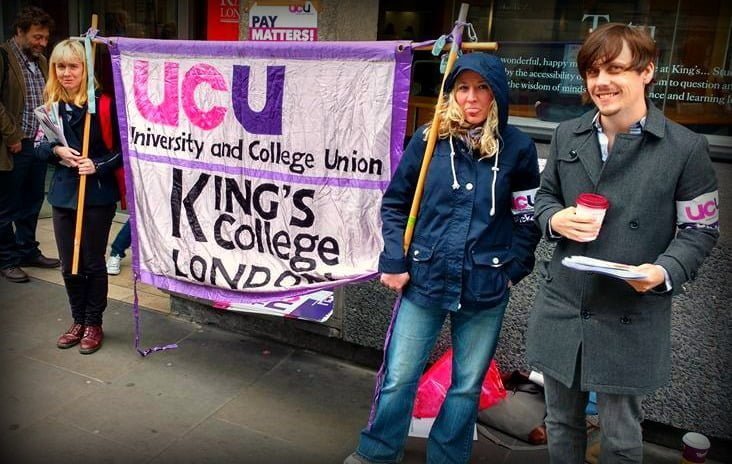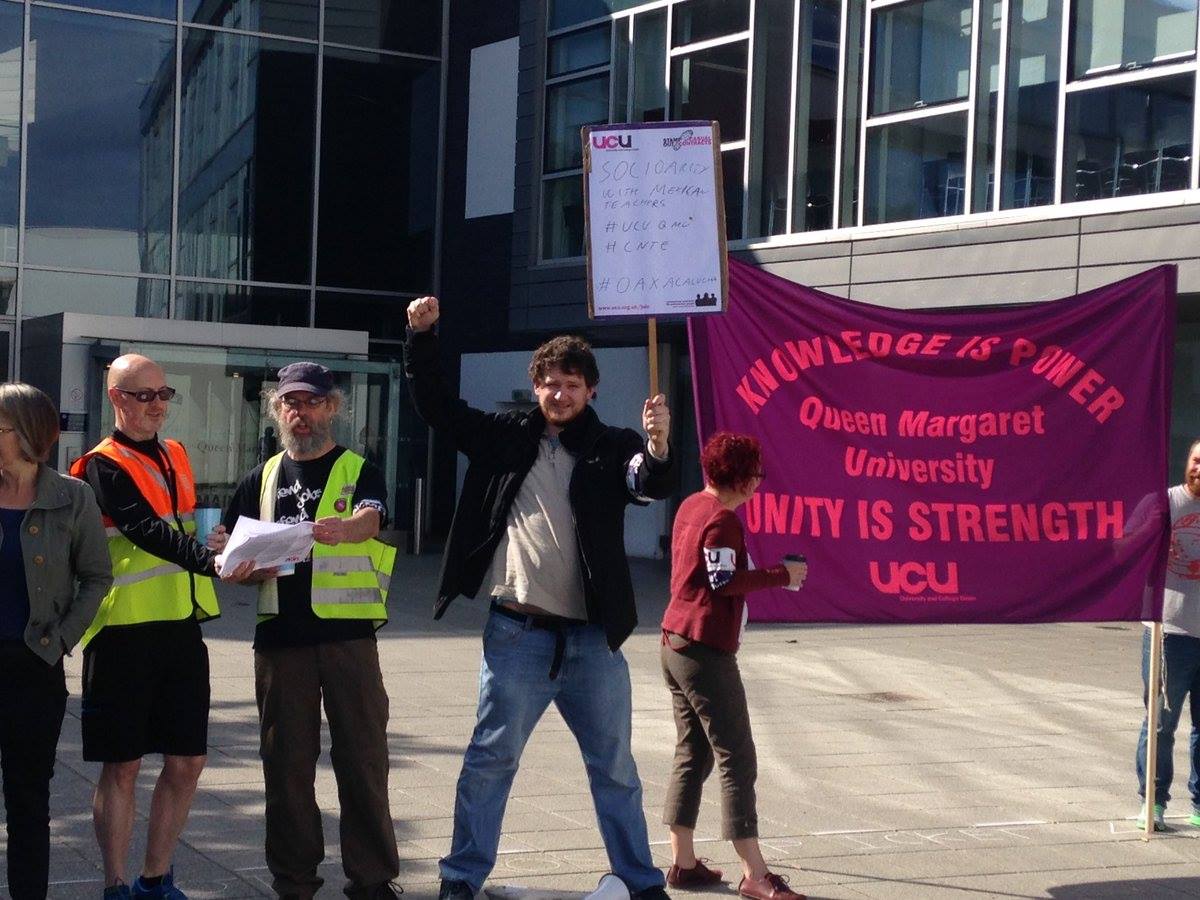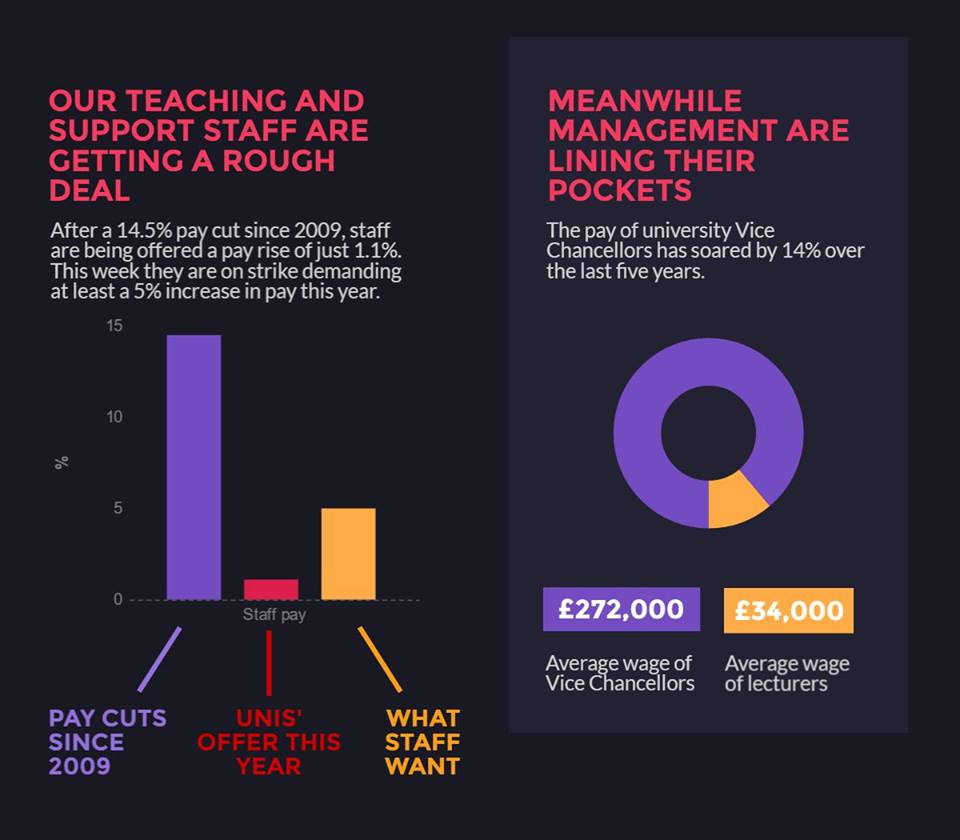Higher and further education staff are out on strike this week in an on-going dispute with university and college bosses. This follows a national, two-day strike on May 25th and 26th, which saw thousands of education workers down tools across the country in protest over low pay. We publish here a couple of reports from UCU members on strike.
Higher and further education staff are out on strike this week in an on-going dispute with university and college bosses. This follows a national, two-day strike on May 25th and 26th, which saw thousands of education workers down tools across the country in protest over low pay.
We publish here a couple of reports from UCU members who have taken strike action recently.
The academic union UCU balloted for industrial action in May after receiving an offer of a 1% pay increase by the Universities and Colleges Employers’ Association (UCEA), which is below the rate of inflation as measured by the Retail Price Index. The ballot received a 35.5 per cent turn out, with two-thirds of voting members supporting strike action.
This insulting pay deal comes off the back of wage cuts for frontline teaching staff (15 per cent in the past six years) and swelling salaries for management (14 per cent in the same period). In other words, the workers are being short-changed, while extortionate student fees are being used to line the pockets of the fat-cat principals and vice-chancellors.
At the recent UCU National Conference, delegates in Liverpool voted on a schedule of action to follow up the two-day strike. At present, all UCU members are ‘working to contract’, i.e. refusing to perform any overtime or pastoral work. Thousands of external examiners have also resigned at the urging of the union.
There was some debate at Conference over a strike schedule that looked very radical, but in actual fact targeted ‘soft’ dates during the holidays. This schedule, it was argued, was imposed by the UCU leadership without sufficient input or consultation from the membership.
UCU branches were mandated to select a day of action in June and July, with some targeting open-days and others set to co-ordinate their action in solidarity with the teachers’ union, NUT, which is expected to call a national day of action on July 5th. These strikes will be followed by marking boycotts in the Autumn.
Kings College London
 One of the universities on strike today, King’s College London, called its action to coincide with a key meeting by senior managers, who (if a recent staff survey is anything to go by) are roundly despised by the university workforce. Principal Ed Byrne is one of the best-paid civil servants in the country, with an annual income of £452,000, and it has recently been revealed that King’s has the widest gender pay gap in the country.
One of the universities on strike today, King’s College London, called its action to coincide with a key meeting by senior managers, who (if a recent staff survey is anything to go by) are roundly despised by the university workforce. Principal Ed Byrne is one of the best-paid civil servants in the country, with an annual income of £452,000, and it has recently been revealed that King’s has the widest gender pay gap in the country.
A union executive and Film Studies lecturer said that this day of action “must carry us into more assertive measures in the new term.”
“The UCU has a lot of work to do if we’re going to reverse the damage being done to higher and further education by marketization and casualization – which are ultimately two tributaries to the same river.”
“Under capitalism, education will always be treated as a commodity and employee-employer relations will always be one of exploitation,” he concluded. “We need to link our struggle with the rest of the trades union movement – beginning with the public sector – in order to win this fight.”
There was much ire on the King’s picket for the Parliamentary Labour Party’s recent efforts to oust left-wing Labour leader, Jeremy Corbyn, who enjoyed wide support at the NUS Conference for his commitment to free education.
An academic from the English Language School described the behaviour of resigning Labour MPs as “disgraceful.”
“It just goes to show who’s side they’re on,” he said. “And it’s not the membership. It’s not workers.”
Joe Attard, KCL UCU (personal capacity)
Queen Margaret University
 There were about 12 of us on the picket line last week on 22nd June. The university wasn’t busy as its the summer period. However the picket was lively, with workers songs being sung. Some of the shop stewards are memebrs of protest choirs so they brought along song sheets. UCU organises about 20% of the QMU staff so unfortunately but expectedly a lot of workers crossed the picket line. However many spoke to us and said they would join for the next one. Whenever a wave of people walked past from a arrived bus or train, we’d start singing a workers song, whilst I was on the megaphone shouting out slogans, and others were flyering. It was fun and made a good atmosphere.
There were about 12 of us on the picket line last week on 22nd June. The university wasn’t busy as its the summer period. However the picket was lively, with workers songs being sung. Some of the shop stewards are memebrs of protest choirs so they brought along song sheets. UCU organises about 20% of the QMU staff so unfortunately but expectedly a lot of workers crossed the picket line. However many spoke to us and said they would join for the next one. Whenever a wave of people walked past from a arrived bus or train, we’d start singing a workers song, whilst I was on the megaphone shouting out slogans, and others were flyering. It was fun and made a good atmosphere.
A University senate was on between 10 and 11 and we sung workers songs (‘Soldiarity Forever’, ‘Power In The Union’, ‘Bandiera Rossa’ etc.) almost constantly outside their window. QMU always hosts Italian teenagers in summer for a summer camp to teach them English etc. Seeing an opprtunity we started singing Bandiera Rossa, most of them were laughing and grinning, probably quite surprised but they were clearly familair with the song, a few clenched fist salutes and some joined in. The teacher asked us to sing Bella Ciao and we did, sort of.
We got supprt from the Students Union. We’d promised them previously to call on the university to donate the our unpaid wages to their hardship fund. We also got a visit from the Rocco the Students Union therapy dog. We did some photos in solidarity with repressed striking teachers in Mexico . CNTE, the Mexican teachers’ union, is in the same international organisation as UCU. We had in the past got UCU Scotland to show solidarity to the missing Ayotzinapa students and solidarity with these striking teachers so the UCU branch was familiar with the #OaxacaLucha situation.
It was a good picket but still a lot of work to do in convincing staff the need to join, organise and strike; and of course as a Marxist, to link the fact that this strike is part of a wider struggle against casualisation, privatisation and capitalism.
Ross Walker, QMU UCU (personal capacity)






